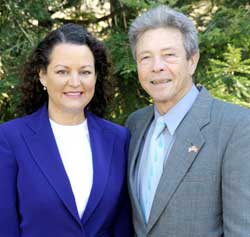Libertarians still fighting for Ohio ballot access

By Maggie Thurber | for Ohio Watchdog
NOVEMBER: Charlie Earl and Sherry Clark are hoping a federal judge will rule in their favor and allow their names to be on the Nov. 4 ballots.
Absentee ballots have already been printed, military ballots have been mailed and early voting starts Tuesday, but the Libertarian Party of Ohio is still fighting to be included in the Nov. 4 election.
Beginning Monday and continuing for three days, they will argue their case before Judge Michael Watson in U.S. District Court for the Southern District of Ohio, seeking to have Charlie Earl and Sherry Clark included in the options for governor and lieutenant governor and Steven Linnabary included in the option for attorney general.
The impact is greater than just who Ohioans can vote for in November.
The fight goes back to November when Gov. John Kasich signed into law Senate Bill 193, which changed the rules for minor parties in Ohio, including invalidating any previously recognized political parties that didn’t meet the new requirements. Opponents of the bill dubbed it the “John Kasich Re-election Protection Bill.”
The LPO filed suit and Watson issued an injunction preventing Ohio “from retroactively applying SB 193 to Ohio’s 2014 primary and general elections.”
With that hurdle out of the way, Libertarian candidates filed their petitions for office, which were certified for the ballot.
Then several individuals filed challenges. They claimed some of the people who collected signatures on the nominating petitions were paid to do so, but didn’t disclose who employed them, as Ohio law requires. They also said the circulators were not members of the Libertarian Party.
The hearing officer agreed and recommended those petitions be rejected, which meant Earl, Clark and Linnabary didn’t have enough signatures to qualify for the ballot. Secretary of State Jon Husted accepted the recommendation and struck their names from the primary ballot in March.
This was the first time when enforcement of the employer disclosure resulted in the disqualification of a statewide candidate. According to court documents, Husted had not been in the habit of checking for employer disclosures on nominating petitions.
Without a primary, the only way the candidates could appear on the November ballot would be as write-ins, but Ohio has a “sore loser” law that prevents unsuccessful primary candidates from running as write-ins in the general election.
So off to court they went again. Linnabary appealed in the Ohio Supreme Court, claiming the individual who challenged his petitions wasn’t a registered Libertarian and lacked standing to file the protest. Earl and Clark went back to Watson to request a temporary restraining order blocking their removal from the ballot.
Watson didn’t grant the temporary restraining order and rejected the request for an injunction. The Ohio Supreme Court rejected Linnabary’s request as well.
So Earl, Clark and Linnabary weren’t on the primary and, unless Watson rules in their favor next week, they won’t appear on the November ballot either.
The ramifications are far-reaching.
To retain ballot access for future elections, the LPO needs to get at least 2 percent of the vote for governor, as it’s only the race for governor that determines whether or not a party retains standing.
If the ruling favors the LPO, Earl believes he and Clark would get to the 2 percent. Even though they’d have only about four weeks to the election, he thinks there’s a lot of disappointment in both the Ed FitzGerald and Kasich campaigns.
“It would be a nightmare, but we could do it,” he said. “I think there are enough angry people that we could manage to get 2 percent. They took eight months out of the heat of our campaign. They minimized our ability to compete, but they haven’t harmed us enough that we can’t survive — if we get on the ballot.”
“Unfortunately, Ohio is a state where all the eggs are in one basket,” said LPO executive committee chairman Kevin Knedler. “Other states have laws where a minor party can retain (access) via vote results for down ticket races or even voter registration.”
Without a candidate on the November ballot, Libertarians won’t get the 2 percent and will be required to follow the new provisions in S.B. 193, which set higher thresholds for certification as an official party.
In fact, if they lose their case, they might skip the 2016 elections, Knedler said.
“Why bother for year 2016?” he asked. “The vote test would be 3 percent for president. That would be the only way for a minor party to stay on the ballot for four more years. That has only been exceeded a handful of times for minor or independent candidates since 1968.”
“What I am saying is that it might be more logical to wait to become a ‘new’ party again for the 2018 election,” he continued, saying that would only require a 3 percent vote test for governor.
And yes, he added, that means the Libertarian Party would “disappear” off ballots in Ohio for four years.
The LPO has two candidates currently on the statewide November ballot: Knedler, a candidate for Secretary of State, and auditor candidate Bob Bridges. Both were write-in candidates in the May primary. They also have 13 candidates for U.S. Congress and the Ohio General Assembly vying for votes Nov. 4.







